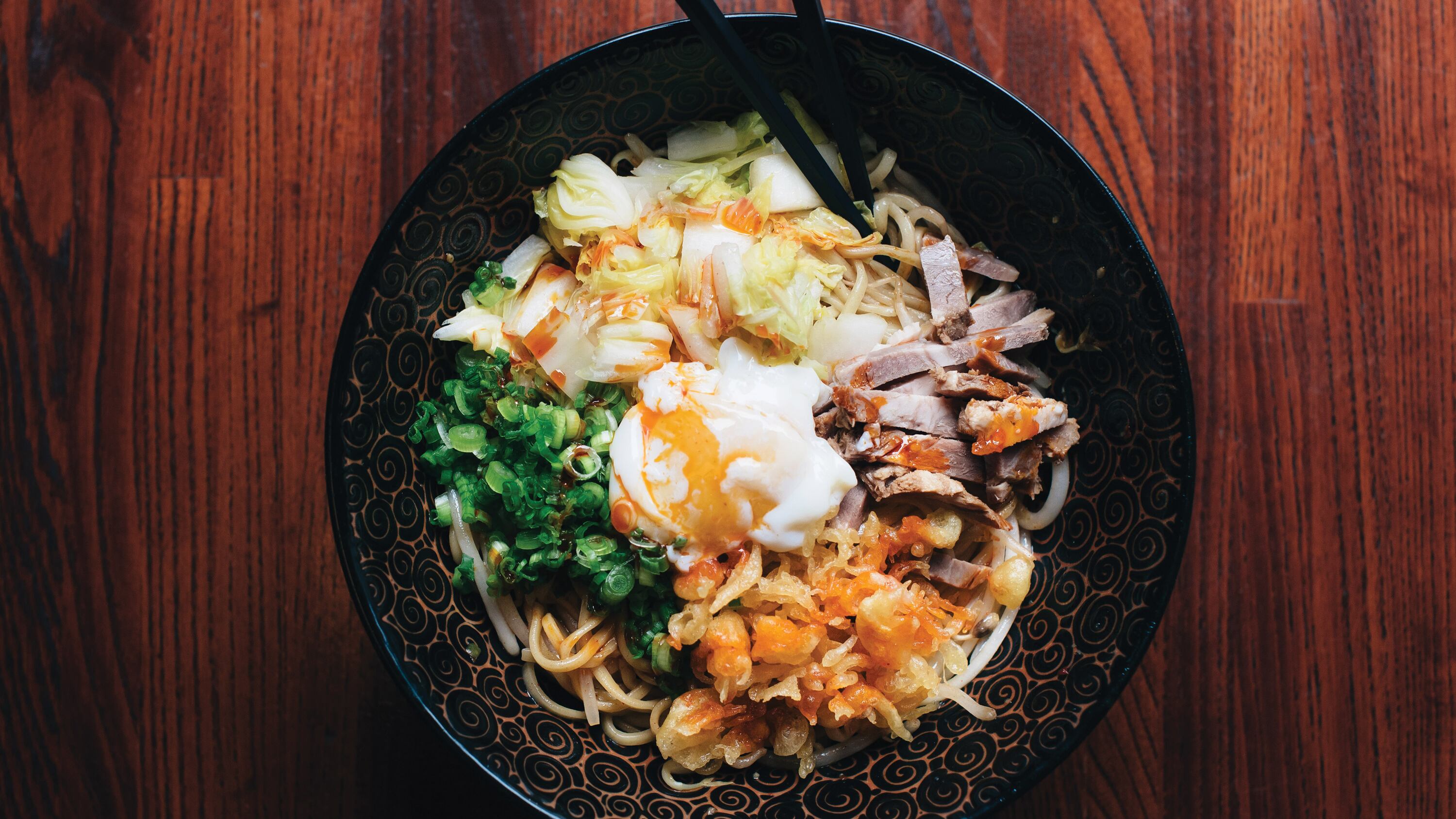Ramen ain't nothin' but a noodle. Generally, it's a pretty thin one with some alkaline salts added, which keep the noodles firm in hot broth and also tasting a wee bit like a soda cracker.
But beyond that, the world is your huckleberry. Sure, there are the traditional four "classes" of ramen covering the three main flavorings, called "tare"—shoyu (soy), shio (salt) and miso (fermented soy)—and also a fourth class called tonkotsu, which describes the super-rich pork broth that came out of Kyushu in the south of Japan.
In a country obsessed with tradition but addicted to novelty, there are seemingly no limits. Depending where you are in Japan, you can pick up abura (oily ramen), mazemen (no-broth ramen) and tsukemen (dipping ramen). There's spicy-ass ramen and ramen that comes with cheese, tan tan ramen with Chinese-style spicy sauce, citrus-laden ramen, and apparently even ramen that tastes like spaghetti Bolognese.
Related: Why Are Tokyo Ramen Shops Suddenly Taking Over Portland?
We slurped our way through more than a dozen ramen houses in Portland and Beaverton, eating 39 bowls to find our favorites of each type. Here's where to get the best of the best of the best in Portland.

Tonkotsu
Tonkotsu shoyu at Marukin ($10)
Thanks in part to the success of Hakata-style ramen giant Ippudo in this country, tonkotsu is what Americans talk about when we talk about ramen. The broth is big, loud, fatty, sometimes sweet and always full of pork—everything we are as a people. Not only that, but tonkotsu is so dense with umami it covers flaws: It doesn't even have to be good to be good, the same way a puppy doesn't have to be cute to be cute. But Marukin's tonkotsu is nonetheless in a class by itself in Portland—slightly light for the form, avoiding both indelicate porky sweetness and the gut bomb afflicting lesser tonkotsus, without sacrificing any depth of flavor. The effect is like an elephant riding a unicycle, terrifying and amazing in the bigness of its balance. If you like spicy, get the red version: Marukin has lately dialed in its chili levels to perfection.
Honorable mention: Beaverton's Yuzu serves a broth devoted to the excessive pork-sweet fatness that Marukin dodges—and it is wonderful, a butterball of pure comfort for which no other broth in town substitutes. If you like garlic so intense you'll wake up in the middle of the night with the smell of it in your sweat, the garlic tonkotsu shoyu at Beaverton's Kizuki is yours to love.

Shio
Yuzu shio at Afuri ($15)
Afuri's American CEO, Taichi Ichizawa, worries that its signature soup—a citric, clarified (chintan, as opposed to paitan) chicken salt broth—might be too subtle for Americans more accustomed to the pork-fisted appeal of tonkotsu. But holy hell: Though certainly light, this soup doesn't feel subtle at all. The citric notes of yuzu swirl with fish-flake brine in a beautifully expressive chicken broth full of deep veggie flavors. If eating were dancing, this soup is Fred and Ginger—it's nimble as all hell, and fools you into thinking love is easy. For fans of Ha VL and Teo Bun Bo Hue's pho ga, which, frankly, should be everyone alive.
Honorable mention: The emulsified paitan shio ($10) at Marukin is like the polar opposite of Afuri's, all richness and chicken fat, like the tonkotsu of chicken. It's a damn treasure. Also, Umai RIP.
Shoyu
Torigara shoyu at Afuri ($15)
Shoyu is the O.G. ramen, the ramen from which all other ramens done sprang—in many ways the baseline and middle ground for what ramen can be, neither light and pure as shio nor palate-filling as miso or tonkotsu. But sometimes this also makes it a poor cousin, light but unsubtle. Not so the shoyu at Afuri: The shop's chicken-bone broth has the floor dropped on its flavor by shimeji mushroom and lightly sweet endive, offset with salty nori and a delicately seasoned egg. Avoiding the woodiness of many local pork shoyus, Afuri's broth is like a depth charge for soy, a palate-changing monster from the center of the earth.
Miso
Spicy yuzu miso at Mirakutei ($11.50)
Miso is the youngest of the Big Four, coming out of Hokkaido in the '60s alongside a mess of curried ramens, throwing a wash of sweet fermented soybean into the tare for a never-miss formula. Mirakutei uses the citrusy sweet-heat formula perfected by the Caribbean to make an equally perfect flavor bomb, deepened with miso ferment like the pith to a fruit, with a wonderfully satisfying circular slab of pork chashu.
Honorable mention: Marukin's pork-chicken miso shoyu ($10) is beautifully simple, its flavor easing in like an old recliner; it's as if the basic soy-sauce broth were always anticipating the ferment. Also Afuri's vegan miso (see below) shames most in town.
Vegan
Black truffle miso at Afuri ($18)
Japan doesn't do vegan much. And yet, this wholly vegan broth is the finest no-meat broth in town—with a black bean miso aged 8 months until the ferment grows into its character, with still more earthy depths in the form of truffle, shiitake and lightly smoky hoji tea, amid that riot of ferment and the gentle herbal notes of Chinese chive.
Honorable mention: Until last month, I would have sent you straight to Biwa spinoff Noraneko in the Water District, whose shiitake broth was up to then the richest and most satisfying vegan broth I've had—though I prefer to unvegan it with Noraneko's baconesque chashu and delightfully salty seasoned egg.
Tsukemen
Chicken tsukemen at Kizuki ($10)
Tsukemen has a thick noodle used for dipping into a much-condensed broth. It's a strangely addictive ritual, accentuated by glutinous noodle and density of flavor, with greens and chashu also there for the dipping. You have shio and tonkotsu options, but Kizuki's rich chicken broth is its true treasure. Once you're done, pour in clear broth as dilution and drink your soup.
Abura soba
Abu ramen at Shigezo Kichinto and Yataimura Maru ($10, $5 at happy hour)
Abura soba, "oily ramen," dates back to the '50s and is much, much better than the name would have you believe. The abu ramen at Shigezo, introduced at its Minizo cart, is perhaps the best thing Shigezo makes, a lovely soft-egg-sopped, chashu-thick ramen drenched in salty-sweet soy kaeshi and chili oil. Think of it as soy-chili ramen carbonara.

Wild-style
Italian miso at Yama ($11.95)
There is no reason for a Parmesan-cheese, Italian-spiced "Bolognese" beef ramen to exist—it's like one of those alternate histories written by Newt Gingrich. And yet here we are, slurping a beefy, cheesy world ripe with miso ferment and satisfyingly alkaline, springy noodles. Can it really be wrong when it feels so right? The answer, when it comes to ramen, is always no.
Ramen shops visited:
Afuri, Akasuru, Boke Bowl, Boxer Ramen, House of Ramen, Kayo's Ramen Bar, Kizuki, Marukin, Masu Sushi, Mirakutei, Noraneko, Ramen Ryoma, Shigezo Kichinto, Shigezo Yataimura Maru, Yama Sushi and Izakaya, Yuzu.


Why Are Tokyo Ramen Shops Suddenly Taking Over Portland?
We Tried 39 Bowls of Portland Ramen—These Are the Very Best, By Style
Pono Farm's Shabu Shabu Takes Portland Hot Pot To A New Level
Are You Confused About Hot Pot? Here's How Long You Should Cook Everything For
Tournant's Pozole Night is a Soul-Warming Event Built On Locally Made Hominy
The Epic Journey of the Family Behind Ha VL, Portland's Most Famous Broth Masters
Three Soups At Ha VL You Must Try
Jacqueline Is Reviving Cioppino, The West Coast's Sloppiest, Spiciest, Fishiest Soup
Lagman Is the Ramen of Central Asia, And One of Portland's Rarest Exotic Soups
The Kenny & Zuke's Chef Reveals How to Make His Much-Loved Hungarian Mushroom Soup
The XLB Soup Dumpling Craze Is Finally Coming To Portland

